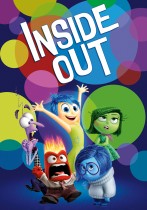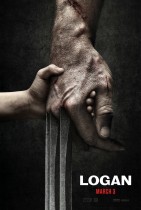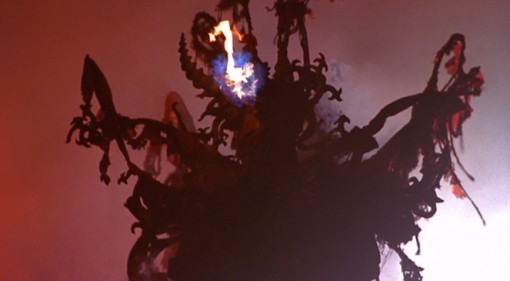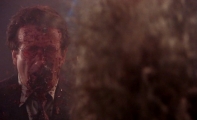The Fisher King (1991)
Synopsis
Self-obsessed New York shock jock Jack Lucas is about to hit it big as a TV celebrity when disaster strikes and one of his radio listeners goes on a killing spree. He is plunged into a dark night of the soul from which he can recover only through a process of redemption. His chance for healing comes along when Parry, a deranged man who lost his wife to mentioned radio listener, sets his eyes on him and identifies him as “the one”, the man chosen to reclaim the Holy Grail. The ensuing journey weaves Jack and Parry’s worlds together and promises psychological healing for the both of them. But before they can be released from their respective private hells, they must join forces to vanquish the demonic Red Knight who keeps them there.
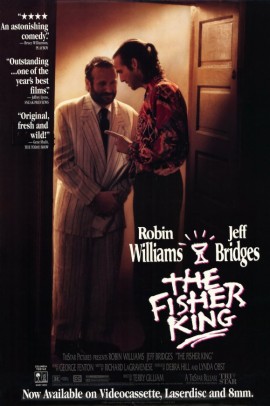
| Genre | Drama, Comedy |
| Production year | 1991 |
| Director | Terry Gilliam |
| Male actors | Robin Williams, Jeff Bridges |
A mythic journey for modern man
by Eivind Figenschau Skjellum
Right out of Arthurian lore comes the famous Fisher King myth, a story about a wounded masculine feeling function and the subsequent healing of it by a fool. It comes in many forms, but the version told by Parry in this movie starts with a prince who has to sleep alone in a forest to prove he can be King.
Alone by himself at night, he is visited by a sacred vision of a fire with a holy Grail in it. A voice tells him that he shall be the keeper of the Grail that he may heal the hearts of men.
The young prince is overcome by feelings of grandiosity and reaches in to grab it. The Grail disappears and the boy’s hand is left terribly wounded. Another version of the same myth leaves him with an arrow through his testicles.
In all versions of the story, the wound grows deeper as the years pass, and the boy – now King – knows by consequence no joy or love in his life. He is always miserable. He begins to die.
The Fisher King wound in modern man
I want to examine the wound itself before digging into the movie’s plot. In his short book on the Fisher King myth, Robert A Johnson talks about this wound as “probably the most common and painful wound which occurs in our Western world”. Robert A Johnson explains to us that it is a wound “in the male, generative, creative part of his being” and that it “affects every sense of value in his psychological structure”.
So how does the wound appear? The playful, active boy who is told to sit down and be quiet receives a shock (wound) to a nervous system that only seconds ago was so alive. The mother who shames her son’s sexuality “shoots an arrow through his testicles” and wounds his sexual feeling function. A son who requests his father’s blessing and receives only his aloofness and temper ends up distrusting men and his own masculinity and a deep wound cuts through his psyche (Robert Bly refers to this as the father’s axe blow).
If the wound were only an issue of family systems gone wrong, maybe we wouldn’t be so ill off. Alas, the weapons by which the wounds are inflicted are woven into the very fabric of our society, leaving us scarred all over by the time we turn twenty.
Maybe we divulge an authentic spiritual experience to our local religious leader and find ourselves targeted and programmed, like sheep, with the officially sanctioned version of religious “truth”. Or maybe we go to school to learn the Soul-devouring “truth” that the only valid way of perceiving the world is through our rational faculties. Whatever the cause, the wound grows ever deeper.
So in my opinion, the pertinent question isn’t whether we have a wound. Rather, it is – how can we heal it?
Jack reaches for the Grail
Jack is a deeply unsympathetic, self-absorbed man. He is a “shock jock”, proudly polluting the hearts and minds of the New York masses with his preferred flavour of nasty. He is about to hit TV screens with the new comedy show “On the radio” and in watching his preparations for the show, we witness his visions of grandeur. And just like the self-obsessed prince, God’s call to heal the hearts of men is drowned out by megalomania.
I interpret the TV show Jack is about to star in as a Grail of sorts to his psyche. He muses to himself that for the first time in his life, he will be “a voice with a body”. This “re-embodiment” sounds to me like a weak attempt at a return of feeling (a body feels), a process thwarted by Jack’s inability to take the requisite move towards greater humility. So his Self calls for a deeper wound to wake him up: Edwin, one of his listeners, goes on a killing spree. Jack is the reason why.
It would be mispreresenting the myth to say that this is a typical Fisher King wound. For that wound damages the generative, feeling part of his masculine psyche whereas this event is the start of Jack’s long road back to his. But the movie as I understand it really wants this to be Jack’s Fisher King wound so I think the parallel works for now.
Parry, the White Knight fool
We return to Jack three years later and images of the tragedy still haunt him as he spends his days sweating out the pain in the back room of his new girlfriend’s video store (I see parallels to Nathan Algren in The Last Samurai). Anne is a good woman who loves him in spite of his masochism. And yet, Jack goes out one night to end himself.
Jack’s personal hell is mandatory. It just shows us that under the layers of crap, his Soul works just fine. The fall from Grace is not so much about “deserving punishment”. No, folks, I don’t think the Universe is designed by some grumpy old dude with a stick and an ass-whipping fetish whose name can be called on by people of inferior spirituality and hot temper (worst blasphemy there is). The fall from Grace is rather the Self’s clarion call to the Universe for help, help to restore a man’s image of himself to its appropriate size.
As long as overinflation is occurring, healthy relationship to the divine (or indeed anything at all) is impossible, and the man remains immature, self-absorbed and absolutely fucking miserable (trust me when I say I’ve been there. In fact, I still sometimes – or was that often – am).
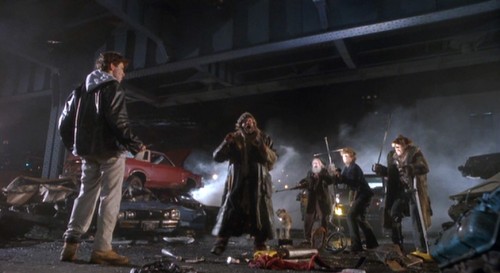
Just as Perceval destroys the Red Knight in the myth, so does Parry save Jack from the thugs who assault him
Before Jack takes the plunge, two young thugs appear with a desire to fuck him up. But self-proclaimed knight Parry intervenes with his crazy compadres. Jack lives.
Parry, we find, is absolutely off his rocker. He speaks to invisible, floating fat peple and thinks he is a knight on a quest for the holy Grail. Not much later, Jack learns that the cause of his lunacy is that his wife’s brains were splattered all over him because of aforementioned Edwin. Jack now feels guilty for creating Parry the slumdog knight from the remains of the man formerly known as Henry Sagan, university professor and mythology expert. A bond forms between them.
Importantly, Parry is haunted by images of a Red Knight. The Red Knight of the myths is generally associated with power, might and ego. It is a fierce and dangerous energy, yet it is essential for masculine maturity (read more about the Red Knight).
The Red Knight appears for Parry when his mind starts reconnecting with the truth of what happened to his wife at the restaurant.
Parry himself sees the Red Knight as the reason why he can’t get his hands on the Grail, which is why he needs Jack’s help (he is “the one” according to the little floating fat people).
This Red Knight is clearly important. Let’s get to know this ominous force that separates Parry, and by extension Jack, from the healing powers of his Grail.
Getting intimate with the Red Knight
Perceval was the fool of the original Fisher King myth and the story goes that he encounters and kills a Red Knight early on in life. The Red Knight also appears in the fairy story of Iron John. In Robert Bly’s opinion, he symbolizes the first step on the long road to masculine maturity and is followed by the White and Black knight stages. True to White Knight form, Perceval was a naive young mama’s boy who thought he could rescue the world from evil.
Disregarding the fact that the Red Knight he slays threatens Camelot, it was perhaps not the best thing to do, considering that he spends the next twenty years of his life chasing Red Knight projections (he also fails the first attempt at healing the Fisher King due to fear of speaking up). This is exactly what we do on a large scale in the West today.
We kill or exile the Red Knight because we fear him. We imagine he threatens the Kingdom. Images of him are turned into entertainment porn on the nighttime news and then we assign him a different skin color, religion or ideology to our own.
I look at Parry’s Red Knight and see more than merely the gore surrounding the death of Parry’s wife. I see the death of Parry’s primal, masculine power – his own inner Red. A man came and blew his wife’s brains out (a man, incidentally, who had himself exiled *his* inner Red Knight) and there was nothing he could do about it. With one spray of shotgun pellets to his wife’s head, whatever Red may have existed in Henry Sagan was wiped out and externalized as a projection of a demonic Red Knight.
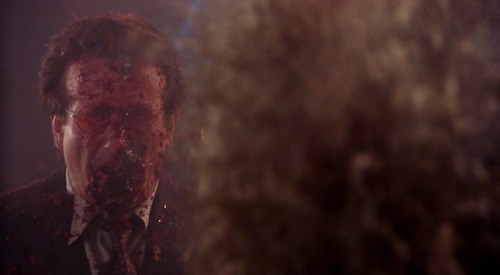
Henry Sagan (Parry) covered with his wife’s brain. Such an experience might cause many a man to shut down his inner Red.
The Red Knight is chasing us wherever we look. We project and make others out to be bad, dangerous, even demonic (war on terror anyone?). We see the Red Knight in the faces of good people (terrorists not included). Why? Because we have all had our stories of receiving shocks to our nervous systems while growing up (though perhaps not quite as severe as Henry Sagan’s). For some, it was perhaps trying to protect Mum from an abusive Dad. Or perhaps it was being bullied by a kid in school. Whatever the reason, we received a shock and decided Red was dangerous.
This fear of Red often manifests in a man’s life as his longing for comfort and security; Red feels too intense. So we exile it from our psyches, condemning ourselves to a lifetime of paranoia, boundary issues and projection.
Now that we named the suppression of Red energy that goes on in virtually every modern man, let’s enter sacred reality and get this show on the road.
Entering crazy time
After Parry shares his first kiss with his chosen damsel in distress, the Red Knight appears one last time. It is the final showdown – as long as Parry is not willing to integrate his Red Knight projections in a conscious way, he must die to his current self through trauma. The Red Knight gets him and Parry enters a coma. It is interesting to note that the thugs who represent the Red Knight in this scene are the same as the ones who attacked Jack in an earlier one. It suggests to me that Jack and Parry share a psychological theme – suppression of Red.
Jack realizes that he must get the “Holy Grail” to wake Parry up from his catatonia. He now gets to prove that he is “The One” the floating fat people talked about by turning into “Parry’s Perceval”. This will make him humble and force him to accept Parry’s crazy view of the world. He intuits that Parry’s and his healing are intimately connected, as he already shared with Anne in an earlier scene (“I thought that if I could help him some way, that maybe things would change for me”).
Parry has something that Jack needs. We understand that particularly from the way Jack reacts to the TV producer who wants him to star in a new show about homeless people. Jack is horrified by the depraved worldview that would enable a man to glorify other people’s suffering and turn it into shits and giggles. Instead, he turns his back on this career-furthering move and favours honoring his new depth of Soul. In Parry resides something that he needs to get more intimate with.
Which leads us to crazy time. What is it I hear you ask? It is a term referring to the “sacred time” a man has to enter once he is called there by his archetypal Self. In crazy time, normal flow of time and space ceases, and a vast, archetypal landscape opens up before the man. Without a good guide, this landscape can consume him and make him go nuts (like Parry). It is not necessarily an exactly *pleasant* experience.
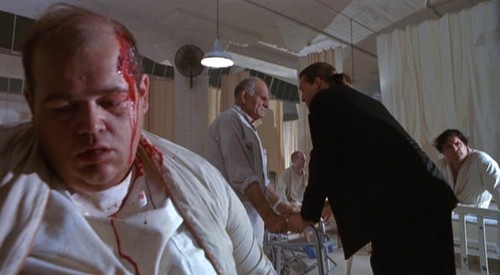
When Jack asks the crazy people at the hospital “what am I supposed to do?”, we are alerted that he is about to enter crazy time himself.
I have some personal experience with this. When I was in my early twenties, I literally feared I was going insane. I feared I would end up doing something horrible one day and pictured that…I’m not sure why I’m telling you this…I would end up stabbing someone to death. It wasn’t that I wanted to, it was just that the Red Knight energy inside of me was so thoroughly suppressed that it was in danger of consuming me. And no mentors or guides were there to help.
In an old indigenous culture, I might have been made shaman. Robert Moore and Douglas Gillette tell us that shamans were always chosen among those who exhibited signs of psychological instability, because that was seen to be an expression of a psyche finely attuned to the mysterious dimensions of the Magician archetype.
A man’s journey through crazy time teaches him enormously valuable lessons about psychological and spiritual healing. For me, it has manifested in a profound understanding of how razor thin the edge between sanity and insanity is. I see clear as day how easy it is to be driven to murder by inner voices (the old cultures would call them demons, I call it suppressed psychic material). And ultimately, this experience has made me question what sanity really is (I see many people our culture would label sane and think they are out of their fucking minds).
Such reflections make a man a good fit to be shaman. There was an idea among the Inuits of the Arctics that any demonic force that the shaman to be had not already been consumed by would be outside of his field of influence once he assumed his fully embodied shamanic role. It explains why I consider my failing psychological stability from my early 20s one of my life’s greatest gifts.
We see how references to crazy time is spattered all across the movie. And when you understand the concept, you will understand that when Jack finds himself in a situation surrounded by seeming insanity (in this movie, these places are ironically health care institutions), the setting is ripe with healing potential.
In our ignorant part of the world, however, we decide to medicate against crazy time. I believe this is one of the most important reasons for why we live in such a Soulless society. Crazy time is Soul time. And there is very little Soul in Prozac.
Reclaiming the Grail – a merging of worlds
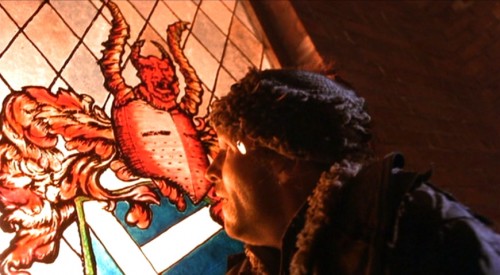
Jack encounters the Red Knight when breaking into Langdon Carmichael’s “castle” in search of the Grail
Jack enters the Fisher King castle and reclaims the Grail from the library of a dying billionaire “King” (in saving him, Jack too becomes Perceval).
When Jack returns to the hospital with the “Grail”, a merging of worlds seems to have taken place. I think crazy time has been integrated into “Newton time” (my invented expression for linear time) and that Jack and Parry emerge on the other side of their quest together, on the third and last stage of the process of constellating the Magician archetype explained by so many scholars of world mythology:
- The Call (life conditions force you to take on a new perception of reality)
- Crazy time (the deconstruction of old reality)
- Reentering Newton time from a new perspective (psychological integration has taken place)
At any rate, the Red Knight curse is gone, Anne and Jack are back together and happy, Parry has his damsel, and Jack and Parry go cloudbusting nude in Central Park together.
At the end of the day, who cares what happened – as long as you can break apart clouds with your mind while lying nude next to a good buddy? Hang on… am I going crazy?
Powerful ideas from The Fisher King
- The Fisher King wound is a wound in a man's generative part and affects all parts of his psyche. It is ubiquitous in the Western world and prevents most men from developing a healthy masculine emotionality and a joyful and impassioned life experience.
- Jack's hubris is followed by his nemesis. When a man develops godly pretensions, his Self will step in and facilitate the man's fall from Grace. So be careful - you have a fully working Self and it will sabotage you for your own good if you develop extreme self-inflation.
- Jack's dark night of the Soul is a requisite process of transformation. Without this suffering, he would not have found maturity. So when you yourself experience authentic suffering, keep this spiritual context in mind. It will make it easier to navigate Hell.
- We repress the Red energy in our society and by consequence we turn into disembodied White Knights who see projections of Red all around.
- Modern man's perhaps biggest challenge is re-embodying this Red. He must heal his boundary issues, defend himself from the forces of chaos, withdraw his projections and return from his ascension trip into spiritual or intellectual la-la land. Through plunging into these primordial Red waters, the Black Knight starts to materialize within us and we will become a powerful force of good in the world. This is a journey that you should start right away.
- There is a huge treasure hidden in psychological illness. (In ancient cultures, shamans were picked amongst the psychologically unstable men of the tribe. By the time the would be initiates got through the psychic wilderness, hopefully under the skillful guidance of an elder, he had obtained profound insight into the nature of psycho-spiritual healing.)
- To drink from the Grail, a man needs help from a fool. What this means is that any man who places undue importance on his intellect will remain shut down, unable to drink from the Grail.
- To access the healing power of the Grail, a man will have to enter crazy time. (So don't be boring, guys – it prevents your healing)


